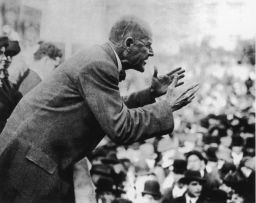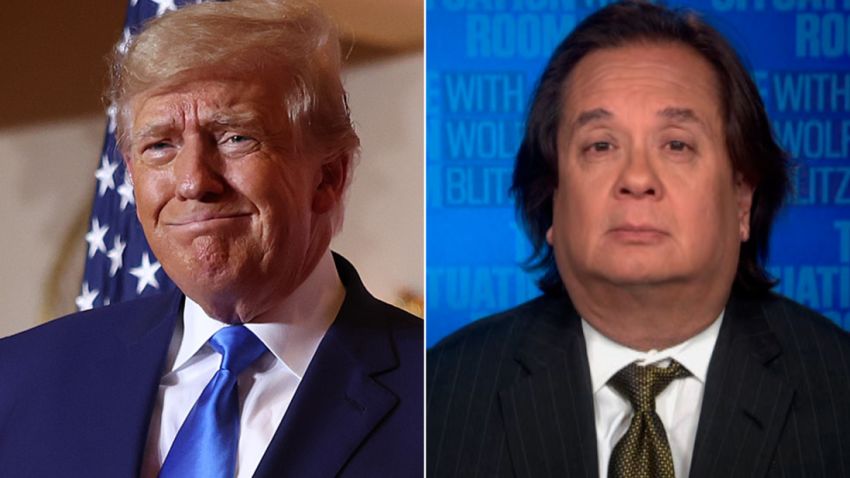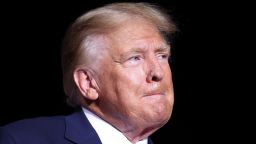The never-ending legal problems swirling around former President Donald Trump are already taking center stage in his freshly announced 2024 presidential campaign.
Trump himself, in his speech declaring his candidacy on Tuesday, ranted about how he was a “victim” of the “weaponization of the justice system,” as he railed against the search the FBI executed of his Florida home as part of a criminal investigation into the mishandling of documents from his White House.
Regardless of whether Trump’s criminal exposure politically undermines his campaign or rallies his supporters, the investigations that could implicate him – which also include federal and state-level probes into 2020 election subversion gambits – won’t likely pose any legal barrier to his candidacy.
It is unlikely that even a conviction would disqualify him from the ballot, according to legal experts.
“It might be a practical barrier, it might be a fundraising barrier, but those are political questions, not legal ones,” said Derek Muller, an election law professor at University of Iowa College of Law.
On the flip side, Trump’s candidacy for president doesn’t, by itself, give him any additional legal protections in the probes. But it does create a more complicated political and practical environment for investigators to navigate.
Can Trump stay on the ballot if he is convicted of a crime?
This question has not been fully settled by the courts, but the general consensus is that neither an indictment nor a conviction would legally prevent Trump from being elected.
Not only have convicted felons run for federal office in the past, but at least one ran for president successfully from prison: Eugene Debs, a perennial socialist candidate for the White House in the early 20th century, won more than 900,000 votes in a 1920 presidential campaign he ran while incarcerated on an espionage conviction.
The reason why it is widely believed a conviction wouldn’t preclude Trump’s return to the White House is because of a mainstream legal argument that only the Constitution sets the standards candidates must meet to be president.

“It’s pretty widely accepted that the qualifications to serve as president are enumerated in the Constitution,” Muller said. “And just being convicted of a felony is not one of them, and states and Congress cannot add to those qualifications.”
That is why many legal experts believe that courts would not uphold proposals by states to bar from their ballots presidential candidates who refuse to release their tax returns, as Trump has refused to do.
Yet if Trump is charged with one of the statutes federal investigators are examining in the Mar-a-Lago documents probe, it might pose the most serious test yet to the constitutional question.
One of the laws implicated in that Justice Department’s Mar-a-Lago investigation, a federal statute that criminalizes the concealment or removal of government records, said that those found guilty “shall forfeit his office and be disqualified from holding any office under the United States.”
“It would present the strongest case for the lawfulness of statutory disqualification that one could make, because of, both, its subject matter – national security – and because Congress spoke so explicitly and expressly,” said Paul Rosenzweig, a former official at the US Department of Homeland Security who also worked on the Whitewater investigation into President Bill Clinton. “My guess is that it would still not stand.”
Do the legal protections he got as a president apply now that he is a candidate?
While Trump was in the White House, he put forward arguments in several cases – sometimes successfully, sometimes not – that his status as president gave him certain legal protections.
But those protections do not now apply to him just because he has announced his bid to reclaim the White House. The residual fights over conduct he engaged in while president will continue, but he doesn’t have any special legal tools to shield things he does or says while he is just a candidate.
“There’s no executive privilege or anything that attaches right now as a candidate,” Muller said.
The main advantage being a presidential candidate gives Trump is the promise of delay: that if he can drag out the legal processes long enough that they are not resolved if and when he is reelected, he can then try to use the presidency as a shield then.
What does his presidential run mean for the criminal investigations surrounding him?
Trump’s announcement that he was running for president did not create any formal, legal obstacles for criminal investigators examining potential wrongdoing by him or his allies. But Trump’s candidacy could inject other political and practical considerations.
As CNN previously reported, the Justice Department was weighing in the weeks leading up to Trump’s announcement whether to appoint a special counsel. DOJ officials have debated whether doing so could insulate the department from allegations that the investigations are politically motivated attacks on President Joe Biden’s 2024 rival.
Attorney General Merrick Garland avoided answering a CNN question about the possibility in March, while insisting that the department does “not shy away from cases that are controversial or sensitive or political.”
As of earlier this month, no decision had been made public.
No matter where Garland lands on the special counsel question, Trump’s candidacy undoubtedly raises the stakes of the investigation. DOJ will likely be especially cautious and only bring charges if the department is extremely confident it could secure a conviction, former prosecutors said.
Trump’s announcement could even speed things up.
“I think that the Department of Justice will, with reason, understand that it needs to move like in the first quarter of next year, before the campaign truly gets underway,” Rosenzweig said. “So it can’t wait … to bring an indictment until January 2024.”
What does it mean for the civil litigation Trump is facing?
Trump faces legal exposure from the myriad civil lawsuits that have been filed against him, which range from a civil fraud case brought by the New York attorney general, to lawsuits seeking damages for his conduct ahead of the January 6, 2021, Capitol attack to the defamation complaint brought by a woman who has accused him of rape.
In the cases concerning his conduct while he was in the White House, Trump has sought to raise arguments about legal protections he said his status as president gave him. But he doesn’t get any additional protections by just announcing a presidential campaign.
“The United States Supreme Court actually approved of civil litigation against President Clinton in the ’90s, while he was sitting as president. So surely, merely being a candidate for office doesn’t prevent these kinds of cases from going forward,” Muller said.
What does the presidential run mean for Trump’s defense?
At least in the immediate aftermath of the announcement, perhaps the most tangible effect of Trump declaring his candidacy, where his legal troubles are concerned, is that the Republican National Committee won’t foot the bill for the attorneys representing him in New York investigations scrutinizing his business practices.
“We cannot pay legal bills for any candidate that’s announced,” RNC Chairwoman Ronna McDaniel told CNN’s Dana Bash earlier this month.
She said the committee was willing to finance his legal defense in the civil fraud case brought by New York Attorney General Letitia James because the RNC sees that lawsuit as “a politically motivated investigation” that started when he was president.
Trump has also used money he’s raised post presidency for his leadership PAC – a fundraising organ usually used to support other candidates – to pay for firms representing him in the James case and other matters.
“We cannot do in-kind contributions to any candidate,” McDaniel said at the time. “Right now, he’s the former president who’s being attacked from every which way with lawsuits. And he’s certainly raised more into the RNC than we have spent on these bills.”



